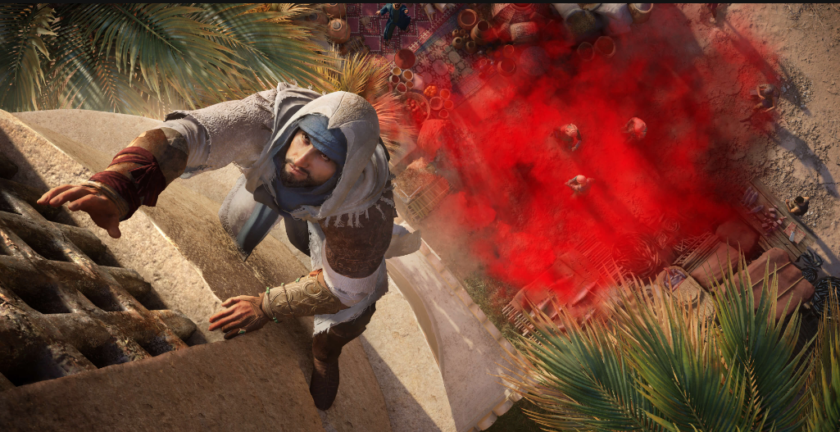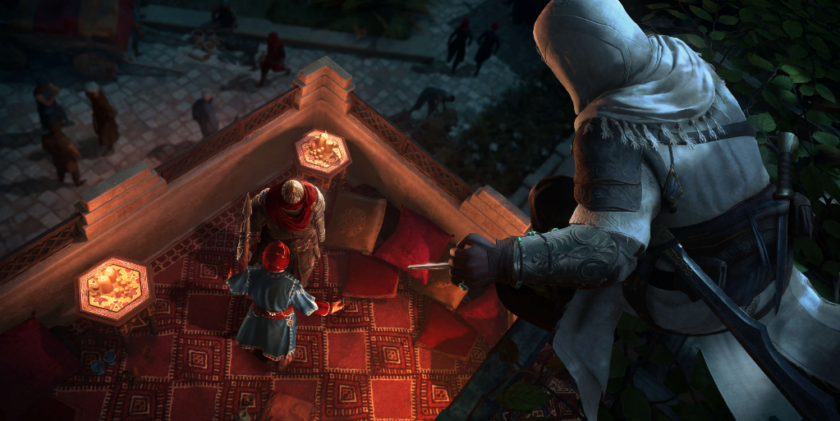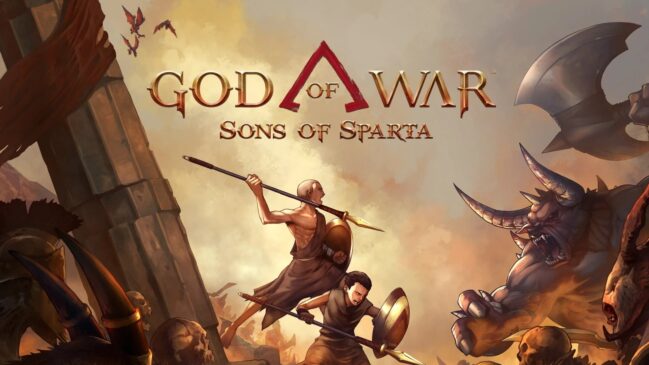
Franchises constantly evolve to cater to the changing preferences of their audience. Assassin’s Creed, known for its captivating historical stories and exciting gameplay, has explored diverse settings over the years, from the Caribbean seas to the Viking landscapes of Valhalla. However, our journey now takes us back to the heart of a bustling 9th-century Baghdad, evoking a sense of anticipation and nostalgia as we return to the series’ origins.
In this review, we delve into the world of Assassin’s Creed Mirage, a game that pays tribute to its roots while redefining the essence of stealth and intrigue. As we assume the role of Basim Ibn Ishaq, a character familiar to fans of Valhalla but in a completely different capacity—a skilled thief navigating the meticulously designed streets of Baghdad—we witness a game that consciously takes a step back from the grandiosity of its recent predecessors to recapture what made Assassin’s Creed an iconic name in the gaming world.
Join us as we explore the nuances of stealth, the art of deception, and the immersive beauty of its historically accurate setting. In this review, we dive into the intricacies of gameplay mechanics, unravel the depths of character development, and scrutinize mission design to offer a comprehensive perspective on what Assassin’s Creed Mirage brings to both long-time fans and newcomers alike. So, prepare yourself, sharpen your hidden blade, and don your hood as we embark on a captivating journey through the vibrant streets of ancient Baghdad in Ubisoft’s latest installment—Assassin’s Creed Mirage.
AT A GLANCE
Developer: Ubisoft Bordeaux
Publisher: Ubisoft
Release date: October 5, 2023
Genre: Stealth action-adventure
Final Score: 9/10
Story
Assassin’s Creed Mirage mesmerizes with its captivating tale of transformation and redemption, immersing players in a stunningly crafted world that brings Basim Ibn Ishaq’s complex character to life. This remarkable blend of historical fiction and meticulous character development weaves a spellbinding narrative that takes players on an enthralling journey, tracing Basim’s evolution from a vulnerable street thief to a determined avenger. Those who experienced Basim as an unsympathetic and austere character in Valhalla will discover how he came to be that way, adding depth and nuance to his persona.
What sets Mirage apart from its predecessors is its unwavering commitment to exploring the depths of Basim’s psyche. Rather than presenting him as a mere archetype, the game delves into the intricate layers of his personality, depicting a man grappling with his own inner demons. As players navigate the treacherous streets of 9th-century Baghdad, they become more than mere spectators; they become steadfast companions on Basim’s poignant odyssey.
The narrative’s strength lies in its exploration of Basim’s inner world, a world rife with conflict, doubt, and haunting memories. This is not a tale of a one-dimensional hero, but of a flawed and multidimensional individual whose journey of self-discovery is both captivating and deeply relatable.
At its core, Mirage is a detective story, seamlessly intertwining investigative gameplay with the overarching narrative. Together with Basim, players piece together clues, uncover secrets, and unravel mysteries that drive the story forward. It’s a truly immersive experience that encourages players to forge a profound connection with Basim’s struggles and triumphs.

While the narrative explores dark and morally complex moments as Basim confronts the shadows within himself, it also offers glimmers of hope and redemption. Mirage fearlessly engages with the moral ambiguity of its characters, pushing them to confront their pasts and seek a brighter future.
One essential aspect of Basim’s character development lies in his relationship with the Hidden Ones, a group that represents both his newfound purpose and an ongoing internal conflict. As Basim navigates a treacherous path of initiation, players witness his struggle to reconcile his former life as a street thief with the Assassins’ ideals of peace through violence.
Basim’s interactions with the inhabitants of Baghdad add further depth to his character. Though he often projects a facade of cold detachment, moments of compassion and understanding emerge as he encounters the suffering of the city’s denizens. These glimpses of vulnerability reveal a character in transition, torn between the hardened armor he wears and the innate humanity within him.
However, the most compelling aspect of Basim’s character development lies in his internal strife. Tormented by his past misdeeds and haunted by the darkness lurking within, Basim embodies the struggle for redemption. His journey becomes a reflective mirror for players, inviting them to confront their own battles with inner demons and embrace personal growth.
Gameplay
Assassin’s Creed Mirage is a welcome return to form for the series, embracing stealth and cunning as its core gameplay pillars. Fans of Altair, Ezio, and other stealthy Assassins will find much to love in this game’s slower, more methodical pace and focus on social stealth.
Our protagonist, Basim Ibn Ishaq, starkly contrasts Valhalla’s dominant Eivor. Starting with minimal resources and devoid of weapons in the early missions, Basim’s vulnerability marks a departure from the relentless force players have grown accustomed to. Ubisoft Bordeaux has embraced a slower, more methodical pace, providing a refreshing change from the brash Viking warrior.

The streets of 9th-century Baghdad serve as our playground, meticulously crafted with every corner, alleyway, market stall, and rooftop exuding historical authenticity. The city’s diverse districts, from the bustling port to the intellectual enclave with its charming Abbasid architecture, offer an engaging backdrop for our adventures.
In a departure from recent entries, Mirage adopts a localized and investigative approach to missions. We collect information, interact with the city’s inhabitants, and engage in pickpocketing with the finesse of a seasoned thief. This return to subtlety and social stealth contrasts the expansive worlds of Valhalla.
Every mission emphasizes smart escape routes, distractions, and careful planning. Basim’s limited combat abilities at the start highlight the disadvantage of brute force. Instead, players are encouraged to think creatively, using the environment and their wits to outsmart adversaries. Knocking over ladders, creating distractions, or employing mercenaries play a part in Basim’s tactics.
What sets Mirage apart from its predecessors is its unwavering commitment to a stealth-first approach. The days of effortlessly dispatching hordes of enemies with superhuman abilities are over. In Mirage, impulsivity and recklessness are met with swift and unforgiving consequences. Basim Ibn Ishaq is no juggernaut; he is a skilled thief who excels in blending with crowds and using his surroundings to his advantage. Going gung-ho is a recipe for certain defeat, making every encounter a carefully considered puzzle.

The game actively promotes Basim’s social stealth skills, requiring players to seamlessly blend in with the crowd and use the environment and their intelligence to navigate high-stakes situations. Setting up distractions becomes crucial when undertaking challenging assassination missions. It becomes a thrilling dance of shadows and secrets, where a single wrong move can lead to disaster.
Assassin’s Creed Mirage offers multiple paths to achieve objectives, granting players agency in their methods. Whether slipping through open windows, luring guards away with distractions, or employing mercenaries, the game encourages creative problem-solving, ensuring unique experiences for each playthrough. However, it’s important to note that while Mirage excels in stealth and subtlety, it inherits movement mechanics from Valhalla. Consequently, Basim’s traversal may feel less agile and fluid compared to earlier assassins like Arno Dorian. Nonetheless, this slight compromise in movement doesn’t significantly diminish the overall enjoyment of the game.
Visuals, Audio, and Performance
Assassin’s Creed Mirage is an extraordinary visual experience, showcasing the mastery of art and technology by Ubisoft Bordeaux. The game’s portrayal of 9th-century Baghdad is remarkably authentic, with every aspect of the world crafted meticulously.
Mirage’s world is a vibrant tapestry, from the bustling streets and towering minarets of the city center to the intricate details of individual houses and rooms. Each district within the city has its own unique character, ranging from the lively port district to the intellectual haven of the Abbasid University.
The attention to detail in Mirage is truly awe-inspiring. From the exquisite pottery and ornate decorations to the bustling crowds of non-playable characters going about their daily lives, the world feels alive and lived in.
One of the most impressive features of Mirage’s visuals is its masterful use of light and shadow. The game’s lighting system is unbelievably realistic, creating a sense of depth and immersion. The shadows cast by the buildings and non-playable characters are particularly well-executed, contributing to a level of realism rarely seen in video games.

Another noteworthy aspect of Mirage’s visuals is its skillful use of color. The game’s palette is vibrant and evocative, capturing the essence of 9th-century Baghdad. The colors are employed to evoke warmth and vitality, further immersing players in the game world.
Assassin’s Creed Mirage’s impeccable audio design complements its stunning visuals, immersing players in the sights and sounds of 9th-century Baghdad. The ambient soundscape of the city is captivating, transporting players to a bustling marketplace filled with the chatter of non-playable characters and distant calls of street vendors. The attention to detail in crafting an authentic historical setting is evident in every sonic aspect.
The Middle Eastern-inspired soundtrack adds depth and cultural richness, seamlessly transitioning between moments of tension and tranquility, heightening the emotional impact of each scene. Serving as a character in its own right, the score guides players through Basim’s journey, complementing the visuals and conveying the emotional weight of his experiences.
Voice acting is also exceptional, with convincing performances that bring characters to life, conveying their depth and complexity. Shoreh Aghdashloo’s haunting and smoky voice as Roshan infuses every scene with an epic quality.
Final Thoughts
Summary
Assassin's Creed Mirage is a refreshing return to form for the series. It embraces the stealth-first gameplay that made the early Assassin's Creed games so beloved, and it delivers a compelling narrative that explores the complex motivations of its protagonist, Basim Ibn Ishaq. The game's setting in 9th-century Baghdad is meticulously crafted, and the audio design transports players to the bustling streets and vibrant markets of this historic city. The voice acting is top-notch, and the soundtrack is a masterpiece that seamlessly transitions between moments of tension and tranquility. While the game is not without its flaws, such as some occasional technical hiccups and a somewhat repetitive gameplay loop, its strengths far outweigh its weaknesses. Assassin's Creed Mirage is a must-play for fans of the series and anyone who enjoys a well-crafted stealth game with a compelling story.




